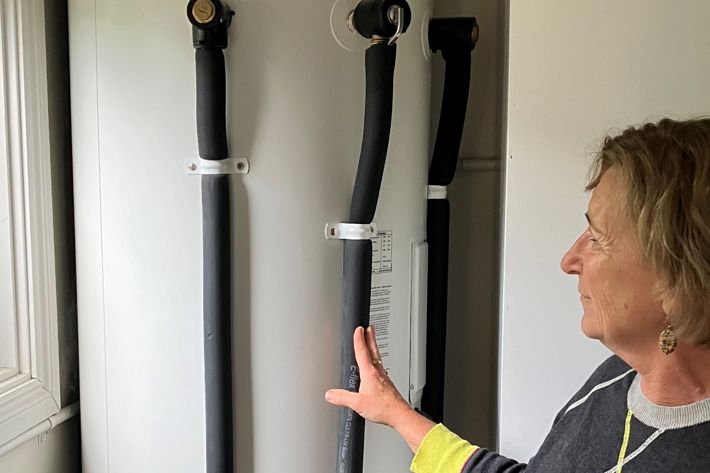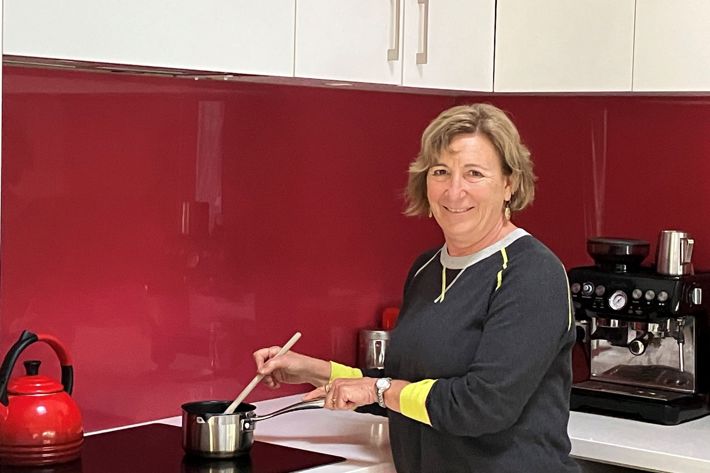Where did your interest in the environment come from?
My interest in the environment has always been there. I've always liked the outdoors and camping. But now I am a self-described climate warrior.
I went to the school's climate strike a few years back in the city. Suddenly I saw all these kids, children, begging for someone to do something about climate change. I just thought, they shouldn't have to ask for a future. It's a terrible situation, where kids are distressed about their world and having to ask us, the people who are capable of addressing the problem, to help fix it. And that was my moment to become an environmental activist! Although we can't solve climate change individually, we can address it and make it a bit better, if we work together. So I thought, I have to take action myself. If I'm going to start talking about this, I must do the best I can. So here I am.
Tell us about your home
It's a free-standing period home built in around 1899. We moved in 20 years ago and have been renovating it over the years. We've always been interested in the environmental aspect of the house when making changes. Initially we had a consultant come to our home to advise us of the changes to make the house more sustainable. Now all the windows are double glazed, and the house is fully insulated. We've got insulation under the floor, insulation in the walls and ceiling and even in the light wells.
We've got solar panels and a battery. The battery is connected to the solar and feeds the house. In Winter we still use some electricity from the electricity grid as there's not enough sun hours, but in Summer we only run off solar and make enough energy to export to the grid as well. We've got a groovy app that tells us all this and makes life easy. You can see at any point if you are using solar or if you are getting electricity from the grid. You can look at your energy consumption at any time.
I've planted a native garden and get a wide range of native birds in the garden. We also have a worm farm and a compost bin.
We were already set down this more sustainable path. But we still had all our gas at this point.

Deborah with her electric hot water system
What changes have you made to get off gas?
We had gas hot water, gas heating and a gas stove to replace. I did some research on the web. Things like what kind of stove uses the least energy and how to replace the stove without replacing the whole kitchen. I learnt how to find out the dimensions of the gas stove and then find the same dimensions in an induction stove. I read up about how to use an induction stove so I was feeling confident and ready to go!
I also found out how you can use a heat pump for hot water. It's the same technology as a split system and it's really efficient. So we ended up with heat pump hot water, an induction cooktop and split system heating. We also have a few electric wall heaters that we use for radiant heat once the room has heated up with the split system, for a comfortable type of feeling.
What was the change in your bills?
We were already in credit with our bills with our solar and battery. But the decrease in our bills after getting off gas was noticeable. It was about $950 a year that we saved.
What was the trigger for you to get off gas?
The specific trigger to getting off gas was when I heard former Prime Minister Scott Morrison say we were going to have a 'gas led economic recovery' and we were going to invest in a lot of gas. Knowing as much as I do about gas and its environmental emissions, I thought if Australia's direction is going that way, I was not going to be part of that. That's when I decided to get off gas, and began my personal Covid lock down project.
What barriers did you have and how did you overcome them?
Understanding where to put the hot water tank, as we don't have room outside the house for it was a challenge. We've now put it in the outside laundry which works fine. Again we just needed to understand the dimensions of the unit itself to make sure it fit into the space we had available. The thing that took the most amount of time to work out was the heating and where to place the split systems.
What has made the biggest difference?
The biggest impact has been the induction stove. It's nice to clean, just a nice flat glass surface. The temperature is instant, and you have a high level of control over the ideal temperature, compared to gas which you can't control as much. What it does really well is slow cooking. I can get it to a really low temperature and cook away for hours. The induction stoves are nothing like the old electric stoves that took forever to heat up and cool down.
I find that for foods that are usually cooked over a flame to chargrill them, you can just use the griller in the oven instead. It does take a little bit of time to understand how to use the induction stove top. The gas flame is a visual, you can see it when you are turning it up or down. Whereas the induction stove is purely numbers, so you just have to adjust to the concept. I love cooking with the induction cooktop now.

Deborah with her induction stove cook top.
What would you say to people wanting to take action but not knowing where to start?
I would say choose one appliance first and go with that. The biggest energy expense is heating the house, so if you start with this, you will see the biggest impact on your energy bill. Talk to others who have made changes to their homes to make them more sustainable. Because I made the change, so many of my friends want to know more. It's just that connection with people and understanding the change that makes it seem possible. The vast majority of my friends have made changes and about half my friends will ask me over coffee to chat about what I've done and how to do it. I also do regular talks about getting off gas in the community for those who are interested in the topic just to pass on my knowledge.
The Yarra Energy Foundation have a great website and advice of what to look for. They talk about trusted providers and it's a great resource.
What would you like to see happen in Port Phillip?
In 10 years' time, I hope we have community batteries, and not individual batteries in homes. Then people who can't afford solar panels or those in apartments who can't have solar, could access shared renewable energy at reasonable prices.
There're already community batteries in Fitzroy and Tarneit but we need a network of them. It will reduce our reliance on the electricity grid. That means that when everyone comes home at 6pm and there's that surge of electricity demand, energy could be met locally by power stored in community batteries. It's the idea of maintaining a steady source of renewable energy that can be shared amongst the community. But also hopefully the grid will stop being coal fired and will be powered by wind and solar.
Finally, what do you like about living in Port Phillip?
I love living in Port Phillip. Things like having the bay, taking my kayak out, being a part of the environment and the peace and the beauty. Being out in my garden with the birds and the wildlife, just being connected. It's a great place to live.






